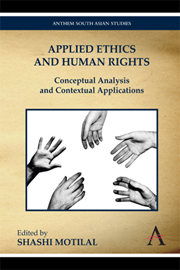Book contents
- Frontmatter
- Contents
- Preface
- Introduction
- Part One Rights, Obligations and Responsibilities
- Part Two Human Rights Issues
- 10 Fragile Identities and Constructed Rights
- 11 Affirmative Action: Compensation or Discrimination?
- 12 Ethics, Human Rights and the LGBT Discourse in India
- 13 Distributive Justice: Locating in Context
- 14 Punishment and Human Rights
- 15 Rights of the ‘Mad’ in Mental Health Sciences
- 16 Choice, Life and the (m)Other: Towards Ethics in/of Abortion
- 17 The Nationalist Project and the Women's Question: A Reading of The Home and the World and Nationalism
- 18 On the Idea of Obligation to Future Generations
- 19 Morality in Cyberspace: Intellectual Property and the Right to Information
- 20 Violence – A Right to the Survival of the Self?
- 21 ‘Moral Obligation’ to Fight for the Prevention of Greater Calamity: A Debate between Sādharana Dharma and Sva Dharma
- 22 Globalisation and Human Rights
- Notes on Contributors
17 - The Nationalist Project and the Women's Question: A Reading of The Home and the World and Nationalism
from Part Two - Human Rights Issues
Published online by Cambridge University Press: 05 March 2012
- Frontmatter
- Contents
- Preface
- Introduction
- Part One Rights, Obligations and Responsibilities
- Part Two Human Rights Issues
- 10 Fragile Identities and Constructed Rights
- 11 Affirmative Action: Compensation or Discrimination?
- 12 Ethics, Human Rights and the LGBT Discourse in India
- 13 Distributive Justice: Locating in Context
- 14 Punishment and Human Rights
- 15 Rights of the ‘Mad’ in Mental Health Sciences
- 16 Choice, Life and the (m)Other: Towards Ethics in/of Abortion
- 17 The Nationalist Project and the Women's Question: A Reading of The Home and the World and Nationalism
- 18 On the Idea of Obligation to Future Generations
- 19 Morality in Cyberspace: Intellectual Property and the Right to Information
- 20 Violence – A Right to the Survival of the Self?
- 21 ‘Moral Obligation’ to Fight for the Prevention of Greater Calamity: A Debate between Sādharana Dharma and Sva Dharma
- 22 Globalisation and Human Rights
- Notes on Contributors
Summary
In this paper I propose to examine two texts by Rabindranath Tagore, The Home and the World, (hitherto abbreviated HW), a novel, and an essay, or more precisely, a set of four lectures published under the rubric Nationalism. HW was published serially in a journal called Sabuj Patra (The Green Leaves), edited by Pramatha Choudhury, in 1915–16 and translated into English by Surendranath Tagore in 1919. The four lectures on Nationalism were delivered around the same time. Rabindranath's critique of the nationalist ideology in these two texts, one a non-fictional narrative and the other a fictional narrative, hinges upon his conviction that nationalism ignores the claims of both individuals and communities who supposedly go into the forging of a nation-state.
In HW, Rabindranath foregrounds the question of women's identity to interrogate the discourse of nationalism. In his recent book, P. K. Datta (2003) has pointed out that the Sabuj Patra ‘phase’ in Rabindranath's literary/intellectual trajectory raises the gender question. Between 1914 and 1917, at least three stories in Sabuj Patra, viz. The Wife's Letter (Strir Patra), Women Unknown (Aparichita) and House Number one (Poila Number) center around women who seek self fulfillment by moving out of Procrustean roles which subordinate them. I believe HW shares more than an incidental literary/intellectual affiliation with these stories.
Bimala in the novel emerges as an indispensable factor to the contrary reformist agendas formulated by her husband Nikhil and his friend Sandip.
- Type
- Chapter
- Information
- Applied Ethics and Human RightsConceptual Analysis and Contextual Applications, pp. 237 - 246Publisher: Anthem PressPrint publication year: 2010

